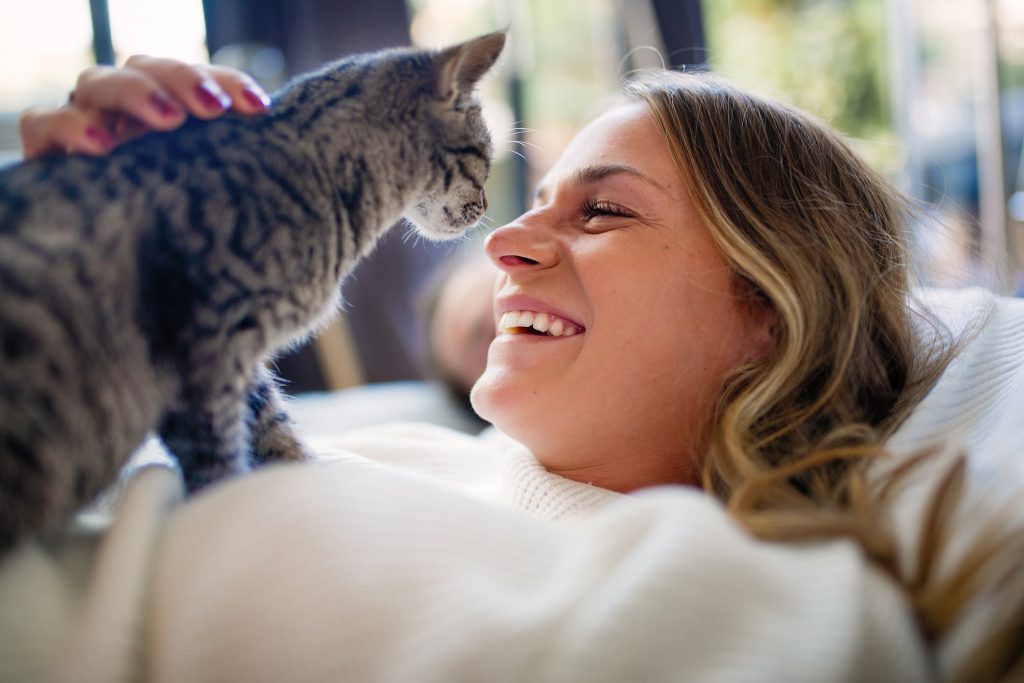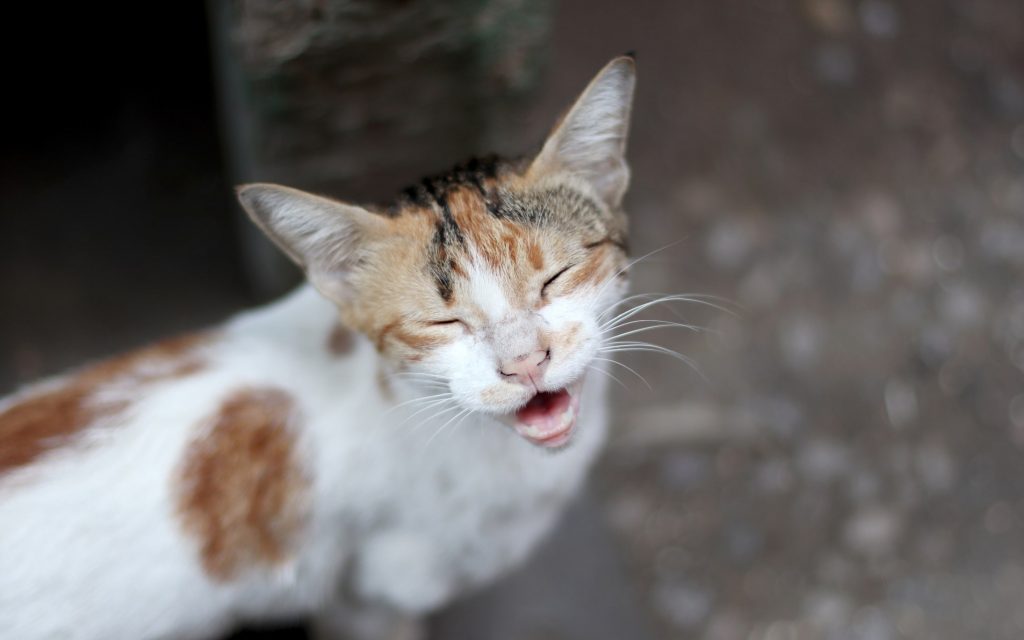If your cat is meowing a lot, it’s a sign she’s trying to tell you something—cats generally don’t meow to other cats; meowing is a cat’s way of communicating with people.
“Meowing is rarely heard in cat-to-cat communication,” says Dr. Katherine Pankratz, DVM, Behavioral Medicine Clinician at Animal Behavioral Clinic in Portland, Oregon. “The meow is believed to be a learned response, often effective in getting human attention.”
And get our attention it does!
Here’s your guide to understanding why your cat is meowing so much.
Why Do Cats Meow?
Cats meow for a variety of reasons, but the most common reason why cats meow is to greet you or get your attention. Hearing your cat meow at you right as you walk in the door is a surefire sign they are happy to see you.
Your cat may be meowing because she is hungry and ready for dinner, or she may be bored and looking for stimulation and play.
If your cat is meowing excessively, something else might be going on—read on for more possible explanations.

iStock/peeterv
Why Is My Cat Meowing So Much?
Decoding why your cat is meowing and what she’s trying to say can strengthen your bond and help you both live a happier, healthy life. Here are some common reasons your cat is meowing so darn much.
You Just Got Home
It would be rude for your cat to not say hello, right? Plus, according to your cat, she just woke up from the craziest catnap dream. While she might not say hello to other felines with a meow, meowing is her way of telling you all about her day and showing that she’s glad you’re back.
Your Cat Is Hungry, or Thinks She Is
Whether it’s around mealtime or she thought you might be heading toward her favorite treats—your cat wants food and she’s not afraid to tell you. If you’re not sure how much your cat should be eating in a day, talk to your vet about her ideal weight and calories per meal, as well as the best time to feed your cat.
If your cat seems to be meowing more frequently or intensely for food or water, she might need to visit her vet to rule out a few concerns. “Some examples of medical conditions that may stimulate this include an overactive thyroid (hyperthyroidism), kidney disease, or diabetes.” Dr. Pankratz says.
Your Cat Sees a Bird
Do your cat’s excessive meows look and sound more like chatting or chirps? That’s totally normal (and totally cute!) cat behavior you may have noticed when your cat sees a bird through the window.
“Experts aren’t entirely sure what to make of it, though some think it’s mimicking the bite cats inflict on prey,” writes Colleen Stinchcombe in our article, Why Do Cats Trill?
Your Cat Is Bored
If your cat is meowing at you while you read this, she might want some quality attention and play. She might nap for 16 hours a day, but in her limited waking hours, she needs mental and physical stimulation—and expects you to help satisfy that need.
“Cats need play just like kids do. It helps them engage, deal with boredom and it helps build bonds between [family members and] other cats in the home,” Dr. Taylor Truitt, DVM, The Vet Set, Brooklyn, New York, tells PetMD.
If your cat is meowing at a lot for your attention or to get you to play, try switching up her toys for a new challenge or give her a new, high-up spot to satisfy her need to perch.

M_a_y_a/iStock
Your Cat Wants to Go Outside
If your cat is indoor-outdoor, she might want you to open the door to let her outside. To cut back on all that meowing, you can consider putting in a cat door and a catio so she can safely let herself in and out.
Your Cat Has Anxiety
Anxiety is very real for cats, and it can look different from kitty to kitty. Some cats may become more subdued than normal, frozen in posture and silent, Dr. Pankratz says. Others might become more vocal, overgroom, or have a change in appetite and eating habits.
“Cats can become stressed due to many things, particularly when there is a major change in the environment like moving or the addition or loss of a family member,” Dr. Pankratz explains. Cats also get lonely and could become vocal when experiencing separation anxiety from you, or another furry companion. A loud, mournful yowl that’s low in pitch might clue you in on your cat’s anxious feelings. If this sounds like your kitty, review these recommendations for soothing your cat’s anxiety, then chat with your vet.
Your Cat Is in Heat
If your cat isn’t spayed or neutered, your cat may be meowing for a mate. Your cat could become pregnant as early as four months of age when she’s still a kitten herself. The yowling will start early too, in males and females, and can last for years. Fixing your cat usually takes care of all that racket—and has numerous other benefits, too.
Your Senior Cat has Feline Cognitive Dysfunction
Feline cognitive dysfunction is thought to be similar to Alzheimer’s disease in humans. As our cats live longer lives, they’re at risk for this form of dementia in their elder years.
“In feline cognitive dysfunction, some cats may have behavioral changes including change in vocalization; particularly a change in vocalization pattern such as vocalizing more at night,” Dr. Pankrtaz says. Cornell University, College of Medicine says some other signs of this disease typical in cats 10 years or more include:
- spatial disorientation;
- wandering away from home into unfamiliar territory;
- lack of interest in playing;
- excessive sleeping;
- altered cycles of sleep and wakefulness;
- long periods of staring blankly into space or at walls;
- indifference to food and water;
- urinating and defecating outside the litter box;
- and seemingly unprompted episodes of loud vocalizing, frequently in the middle of the night.
It can be difficult to differentiate these symptoms from other conditions in senior cats, so it’s best to consult with your vet.

rvimages/iStock
Understanding Your Cat’s Meow
One thing that may help you better understand your cat is learning how to differentiate between vocalizations. Just like dogs have different tones and signals in their barks, cats use differing pitches and frequencies to communicate through their meowing.
You might already subconsciously know your cat’s tone when she’s meowing about different things, but two specific types of vocalizations to listen for are:
- Affiliative vocalizations. This vocalization is shorter in duration and higher in frequency. You might hear this type of vocalization when your cat is “chirping” at the birds, is in anticipation of food, or when an intact female cat is in heat.
- Agonistic vocalizations. This vocalization is longer in duration and lower in frequency, and is typically associated with defensive or aggressive behaviors. Think a growl, hiss, or a loud, harsh shriek expressed during a fearful or painful situation, Dr. Pankratz says.
Is My Cat Meowing So Much Because They’re in Pain?
The good news is that your cat probably isn’t meowing to express pain.
“Meowing is what many people perceive a cat should do when they are in pain,” Dr. Pankratz says. But the reality is that if your cat is in pain, she’ll probably try to hide it. “Cats are often stoic, with a need to not draw attention from potential predators to survive. Often, cats are much more likely to be quieter and more aloof with less social interactions when they are in pain.” Of course, this doesn’t mean any abnormal or excessive meowing should be ignored. So, look for other signs of a stressor and call your vet when in doubt.
How Do I Stop My Cat From Meowing So Much?
If you’ve gotten into the habit of talking to your cat in response to her meows, consider changing your response. “You talking in response might be something your cat enjoys. This may reinforce their behavior, potentially increasing the likelihood of future meowing,” Dr. Pankratz says. Keep in mind if your cat likes these “conversations” and you suddenly stop “talking” with her, it could confuse your cat and cause her to meow even more.
“To better address this, it is vital to meet your cat’s social and psychological needs and adjust the environment to set you and your cat up to succeed,” Dr. Pankratz explains. This might mean cleaning her litter box more frequently, or setting aside dedicated time for play. It’s not always easy to pinpoint your cat’s needs, especially when certain breeds and kitty personalities are just prone to be extra chatty.
But, if everything seems right in her world but the meowing continues, it might be time to consult your vet.
